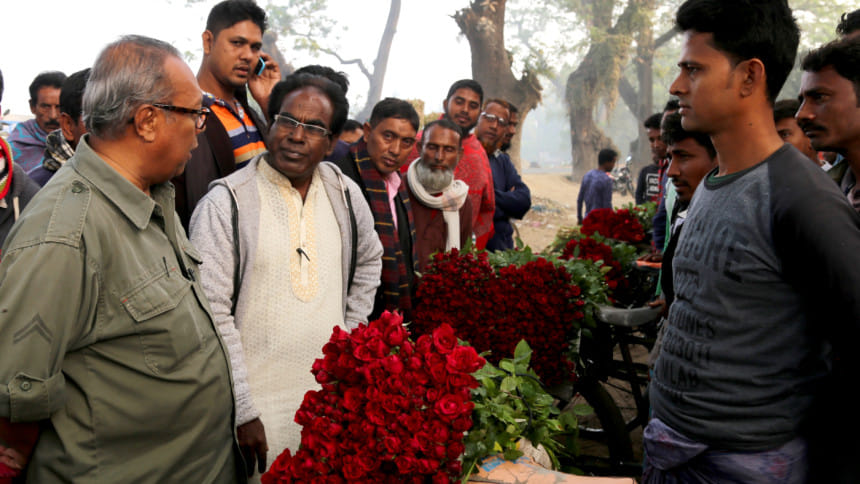Rise of a flower kingdom

Happy New Year.
Dear readers, I first visited the flower kingdom at Godkhali, located in Jashore’s Jhikargachha upazila in 2005. There was a woman named Barisan, who became extremely famous for cultivating rose and used to live in a mud hut then. In a few years, she built a concrete building. The news spread all over the country through Hridoye Mati O Manush that a woman entrepreneur made her own building with the earnings from flower cultivation. Prior to that, you probably would recall Sher Ali, the first-ever commercially successful flower farmer. He comes from the same region. Godkhali became a successful hub for flower farming over the years which produced so many varieties of flowers from across the globe.
Sher Ali later made a poly-shade, made of bamboo, over his paddy field. He started cultivating European cut flowers, especially gerbera. The long journey towards flower farming has branded the area of Godkhali, ‘Flower Kingdom’. During early 2013, I brought the then US Ambassador to Bangladesh, Dan Mozena and also the then Mission Director of USAID, Richard Greene to Godkhali. They learned about the difficulties that flower farmers were facing then. I have been to Godkhali, a few days back to learn about the latest scenario of flower cultivation in the area. My purpose was to identify the areas where farmers need infrastructural development.
It was great to be in company of colour and fragrance at the beginning of the New Year 2020. First I went to the market and talked with some traders and farmers.
“How many flowers do you cut daily?”
“400.”
“Where do you send the flowers?”
“Dhaka. Daily earning for these flowers are around Tk 2,000 (USD 23.55).”
“I once came here with the then US Ambassador. Do you remember?”
“Yes, USAID Chief also came with you.”
“What developments have taken place following their visit?
“We are having stores for preservation and also better connecting roads.”
“That’s good to know.”
Now agriculture means flower farming to the Godkhali farmers. I have witnessed the farmers in Godkhali getting involved with flower cultivation, one after the other in the past 15 years. Most of the farmers say they are now living a much better life than before. Their fates have changed quite positively.
“Previously, we had nothing, but now, we’re doing great. My children can go to school,” says a flower farmer.
“Our livelihood status improved a lot. Flower cultivation is much profitable in Godkhali,” says another farmer.
Every morning the flower farmers bring their produces to the market right beside the highway. They’re pretty much happy selling flowers.
“I spent nearly Tk 80,000 (USD 942.25) to prepare my rose orchard. I’m getting good price for my produces and can provide necessary support to my family,” says a happy flower farmer.
Everything in Godkhali has changed. The beautiful fragrance of the flowers gives much delight to people living here. People engaged with the flower trade are also happy to see this success. I talked with some such successful traders.
“What is your daily budget for buying flowers?”
“Nearly Tk 35,000 (USD 412.23).”
“Where do you send it?”
“Bogura and Satkhira.”
“What’s your daily profit?”
“It’s about Tk 4,000 (USD 47.11).”
There are about 120 wholesalers who work on a daily basis at Godkhali flower market. Since the visit of US Ambassador Mozena and USAID Mission Director Richard Greene in February, 2013, infrastructural changes for the flower farmers started taking shape. That was the most promising factor for the farmers. Hridoye Mati O Manush played a key role in this regard.
Farmers are happy here that foreign donors have made shades for them. Many of these farmers started with rose cultivation, but later on started producing European cut flowers.
A local teacher, Ataur Rahman said if farmers need any financial support such as bank loans, they can get it. This flower kingdom is truly turning into an extraordinary field. Agro tourism has also a great prospect here. People come to visit Godkhali from different regions of the country. The most aspiring thing is the once neglected and poverty stricken Godkhali is on its way to become Bangladesh’s Netherlands not only for its flower fields but also for infrastructure. Sponsored by USAID, a specialised flower processing centre and market, for flower collection, grading, sorting and cooling, is under construction. LGED is implementing the project.
The flower processing centre at Godkhali will be a modern centre of flower trade. It will run many activities including farmer training, flower processing and packaging. I talked with Abdur Rahim, president of Bangladesh Flower Society, about the ongoing construction.
“I am highly thankful to Hridoye Mati O Manush and specially you for showing the world our prospect. That’s why Ambassador Mozena and USAID came forward and that’s how the plans are implemented for an even better future for the flower farmers,” said Abdur Rahim.
Under the project of LGED, 12 modern markets and 12 collection centres will be established in different villages of Jashore. A specialised centre for flowers will also be established in Godkhali. Jashore LGED Executive Engineer Mirza Iftekharul Islam Haque said the cooling centre will have 1,617 square metre floor space. The first floor was funded by USAID. The top floor is totally being done by the funding of Bangladesh government.
“What is the total project cost?” I asked Ifekharul.
“Tk 18 crore for the building. The boundary adds another Tk 10 crore. Including the 100 km road and culvert, its total cost is around Tk 35 crore (USD 4.1 million),” Ifekharul said.
There are tea stalls, fast food shop and definitely the tourists around Godkhali. A flower based community has changed the lifestyle of people here and around the region.

Furthermore, BADC is also working on poly shades, deep irrigation and so on. They are also helping farmers to produce export quality flowers. Now their aim is to export these flowers abroad. They demand to stop the availability of plastic flowers.
Godkhali represents a new field for the country’s agricultural economy. According to Bangladesh Flower Society, flowers are commercially cultivated on at least 12,000 acres of lands in 24 districts of the country. Two million people are directly and indirectly involved in flower farming and trade. In 1983, by cultivating tuberose on 30 decimals of land, farmer Sher Ali began commercial flower cultivation in Bangladesh. Now, flowers of several colours and different varieties are seen on over 15,000 hectares of land in Godkhali alone. Now more than 100 thousand people of 75 villages are involved in flower farming and trade. After the success in shrimp and vegetable production in country’s southern region, flower is working as a revolution in southern agricultural economy. Hridoye Mati O Manush has always been involved in this prosperous economic agriculture expedition. I wish you all a Happy New Year once again and wish you all the best.

 For all latest news, follow The Daily Star's Google News channel.
For all latest news, follow The Daily Star's Google News channel. 



Comments